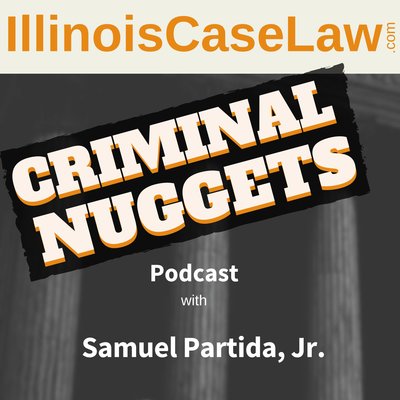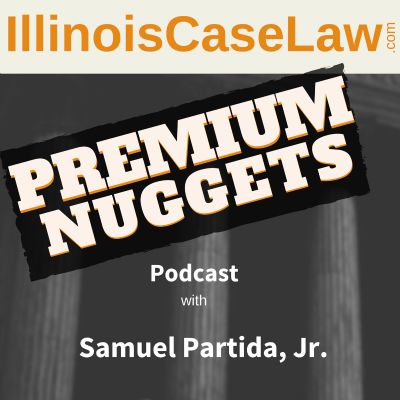Jan 29, 2020
People v. Relwani, 2019 IL 123385 (January). Episode 582 (Duration 10:18)
Defendant needed to say something about the private nature of the Walgreen’s parking lot.
Here’s the lower court opinion.
People v. Relwani, 2018 IL App (3d) 170201 (February). Episode 471 (Duration 7:01)
Charges
Defendant was charged with driving under the influence of alcohol (DUI) (625 ILCS 5/11-501(a)(2)).
Found In His Car
He was found alone in an altered or partially unconscious state behind the steering wheel of a running car in a Joliet Walgreens parking lot at about 3:30 a.m. Under the Illinois implied consent statute (625 ILCS 5/11-501.1), his driver’s license was summarily suspended by the Secretary of State.
Issue
Defendant claims that rescission is warranted because he was arrested in a privately owned Walgreens parking lot that did not meet the definition of a “public highway,” as required by the implied consent law.
The dispositive question in this appeal is narrow:
Was a defendant seeking rescission of the statutory summary suspension of his driver’s license required to offer affirmative evidence to satisfy his initial burden of making a prima facie showing that he was not on a “public highway” while in control of his car?
Defendant Testified
At the hearing on his petition to rescind, defendant was the only witness.
He said he was parked in a Walgreens parking lot located at 1801 Ingalls Avenue in Joliet and was sleeping behind the wheel of his car when he was woken up by police officers, who arrested him for DUI.
During the State’s cross-examination, defendant was often unable to provide clear or responsive answers.
He admitted, however, that the police found him in his car with the keys in the ignition and the engine running. When the State asked whether the reason he did not remember performing some field sobriety tests was “because he was intoxicated and had taken heroin and clozapine (a psychotropic drug used as an antipsychotic medication) that night,” defendant answered,
“I, I don’t know. I guess.”
While defendant was able to confirm he told the police that he “had been driving from the restaurant in Chicago with his family” earlier that evening, he did not recall if he also told them that he had “used heroin and clozapine for his birthday that night” and was “not sure” whether “there was an open bottle of Budweiser beer in his car.”
Directed Finding Granted
At the close of defendant’s case, the State successfully moved for a directed finding, arguing that he had not met his burden of proof in seeking rescission of his statutory summary suspension.
The judge said “here, we have not truly established the fact, by the petitioner’s case, that this truly was—they said he was in the Walgreens, that it was a privately-owned parking lot. If I don’t know that, I can’t assume that simply because it is the parking lot of Walgreens.”
The trial court denied defendant’s motion to reconsider.
Public Highway
A parking lot would be considered a “public highway” for summary suspension purposes if it is publicly maintained and open to the public for vehicular travel. See 625 ILCS 5/1-126 (defining “highway” for purposes of the Illinois Vehicle Code).
A “highway” is defined as “the entire width between the boundary lines of every way publicly maintained when any part thereof is open to the use of the public for purposes of vehicular travel or located on public school property.” 625 ILCS 5/1-126.
While on its face the idea that a parking lot can be a “public highway” may seem to be easily dismissed, “a parking lot that is publicly maintained and open to use by the public for vehicular travel will constitute a ‘highway,’ even if the parking lot is on privately owned property.” People v. Helt, 384 Ill. App. 3d 285, 288 (2008).
Implied Consent Requires Public Highway
Under the Illinois Vehicle Code, the implied consent statute in DUI cases states:
“Any person who drives or is in actual physical control of a motor vehicle upon the public highways of this State shall be deemed to have given consent *** to a chemical test or tests of blood, breath, other bodily substance, or urine for the purpose of determining the content of alcohol, other drug or drugs, or intoxicating compound or compounds or any combination thereof in the person’s blood if arrested *** [for a DUI offense] ***.”
625 ILCS 5/11-501.1(a).
Critically, for purposes of the Illinois Vehicle Code, Based on that definition, a property is a “public highway” within the meaning of the implied consent statute if it is both “publicly maintained” and either open to use by the vehicular public or it constitutes public school property. 625 ILCS 5/1-126.
The Orth Standard
In People v. Orth, 124 Ill. 2d 326, 337-38 (1988), this court concluded that “the motorist, who is requesting judicial rescission of [a summary] suspension, should bear the burden of proof” and must present a prima facie case supporting that request.
While defendant agrees that he was required to establish a prima facie case to support his rescission request, he maintains that he met that burden by relying on the purported inference that any parking lot by a Walgreens store is private property.
If, and only if, defendant makes a sufficient prima facie showing, thereby avoiding a directed finding, “the burden will shift to the State to come forward with evidence in rebuttal justifying suspension.” Orth, 124 Ill. 2d at 338.
In Orth, the motorist argued that the statutory summary suspension of his driver’s license should be rescinded because the result of his breath test was unreliable.
Prima Facia Case
This court explained that to make a prima facie case, the motorist had to present evidence “of any circumstance which tends to cast doubt on the test’s accuracy, including, but not limited to, credible testimony by the motorist that he was not in fact under the influence of alcohol.
If the trial judge finds such testimony credible then the burden shifts to the State. Orth, 124 Ill. 2d at 341. In making a prima facie case, a defendant “has the primary responsibility for establishing the factual and legal bases” for the requested action.
A prima facie case is “a party’s production of enough evidence to allow the fact-trier to infer the fact at issue and rule in the party’s favor.” Black’s Law Dictionary 1310 (9th ed. 2009).
He Said He Was In A Walgreen Parking Lot
Applying that standard to defendant’s contention in this case, he had to offer evidence that the trial court found to be credible. In addition, to ward off the State’s motion for directed verdict and shift the evidentiary burden to the State, defendant’s proffered evidence had to “tend to cast doubt on” whether the parking lot constituted a “public highway” as defined by the relevant statute.
Our examination of the record reveals that the only portion of his testimony that even tangentially related to whether the parking lot was a “public highway” was even more abbreviated. In its entirety, that testimony consisted of two short colloquies. Where defendant is asked if he was in a Walgreen’s parking lot and he answered “yes.”
Defendant asserts this purported inference: the parking lot by the Joliet Walgreens store where police found him is private property, not a “public highway” as defined in the Illinois Vehicle Code. The sole basis for defendant’s claimed inference is, necessarily, the above-quoted testimonial snippets.
Nonetheless, he contends that an inference based on those brief snippets is sufficient to overcome his burden of making a prima facie showing that the parking lot was outside the reach of the implied consent statute.
We disagree.
Analysis
As we have explained, to make his prima facie case, defendant had to offer evidence that “tend[ed] to cast doubt on” whether that parking lot was “publicly maintained” or open to use by the motoring public. See 625 ILCS 5/1-126.
The sum total of the substantive evidence defendant offered on the relevant question in this case consisted of (1) the lot’s association with a Walgreens store and (2) its street address. Defendant’s testimony did not even specify the proximity or physical connection of the parking lot to the storefront or the location of his car within the parking lot.
To make his prima facie case, defendant was obliged to produce “enough evidence to allow the fact-trier to infer the fact at issue and rule in his favor.” Black’s Law Dictionary 1310 (9th ed. 2009).
Here, defendant’s mere reference to “Walgreens,” without more, establishes nothing about either the identity of the entity that maintained the lot or the public’s use of the lot. Those are the essential substantive components for a prima facie showing that the parking lot was not a “public highway” within the meaning of the relevant statutes.
Defendant must provide some affirmative evidence and cannot rely on a passing reference and mere supposition to avoid a directed finding. Here, defendant’s prima facie showing fell well short of the required mark.
Holding
We conclude the trial court’s finding that defendant failed to present a prima facie case for rescission is not against the manifest weight of the evidence. It is certainly not clearly evident from the minimal evidence defendant presented that the trial court should have arrived at the opposite conclusion or that its conclusion was unreasonable, arbitrary, or not based on the evidence.
Affirmed.
Defendant was required to offer some affirmative evidence that the parking lot where he was arrested for DUI was not a public highway within the definition in the Illinois Vehicle Code to make his prima facie case and fend off the State’s motion for a directed finding. Because he failed to provide that quantum of evidence, we uphold the trial court’s directed finding for the State.
What He Could Have Done
After all, property constitutes a “public highway” only if it is both “publicly maintained” and either open to use by the vehicular public or is public school property. 625 ILCS 5/1-126 (West 2016) (defining “highway” for purposes of the Illinois Vehicle Code). To avoid a directed finding against him, defendant could have made a prima facie offering of evidence that tended to cast doubt on either one of those statutory requirements.
It was not truly burdensome for defendant to provide some affirmative evidence simply tending to cast doubt on the parking lot being publicly maintained. Subpoenas or extensive searches of property records would not have been required to support his initial claim.
By focusing on the alleged difficulty of determining whether a public entity maintains the parking lot, he ignores the equally viable option of making his prima facie case by offering affirmative evidence that tends to cast doubt on whether the parking lot is open to public use.
Something as simple as evidence of a posted “private property” sign may, in the proper circumstances, suffice to satisfy the prima facie burden of proof in a rescission action, shifting the burden to present evidence on the lot’s “public highway” status to the State.
Here, defendant did not attempt to make even that minimal showing.



